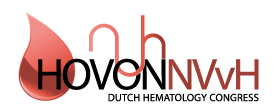Pneumococcal polysaccharide vaccination response in chronic myeloid leukemia and treatment-free remission outcome: the vaccinSTOP study
Patients with chronic myeloid leukemia (CML) may exhibit a suboptimal immune response to pneumococcal polysaccharide vaccination, but data on vaccine responses are limited. As the immune system is hypothesized to play a role in preventing molecular relapse in patients attempting tyrosine kinase inhibitor (TKI) discontinuation, we investigated whether the quality of the response to pneumococcal vaccination in CML patients, as a read out of the humoral immune system correlates with the ability to maintain treatment-free remission (TFR) after discontinuation of TKIs.
We conducted a multicenter open-label prospective association study, assessing IgG anti-pneumococcal titers for 9 serotypes before and 45 days after 23-valent pneumococcal polysaccharide vaccine (PPV-23) administration. TKI discontinuation followed directly after post-vaccination assessment. Our aim was to determine the proportion of patients with an adequate (≥7 serotype titers ≥1.0 μg/ml) response and inadequate response (<7 serotype titers ≥1.0 μg/ml) following PPV-23 vaccination. In addition, we correlated PPV-23 vaccination response with TFR outcomes. Molecular relapse (BCR::ABL1 > 0.1% IS) was monitored according to HOVON guidelines using real-time quantitative PCR.
CML patients were eligible if they were ≥ 18 years old and met the HOVON criteria for TKI discontinuation. Exclusion criteria included prior pneumococcal vaccination and use of immunosuppressive medication.
Forty-eight patients were enrolled, with a median age at CML diagnosis of 51 years (range 15 – 75), and 35% were female. Of the 48 patients, 42% were on imatinib, 56% on second generation TKIs, and 2% on asciminib at the time of vaccination. The median TKI treatment duration was 6.1 years (range 3.4 – 21.5), and the median MR4.0 duration prior to stop was 3.8 years (range 0.4 – 18.5).
Baseline anti-pneumococcal antibody titers were low in all patients. Post-vaccination titers were consistent with an adequate vaccination response in 51% of patients, whereas 49% had an inadequate response. Of the 19 patients treated with imatinib at the time of vaccination, 37% had an adequate vaccination response, compared to 63% of the 27 patients treated with second generation TKIs (χ², p = 0.081).
Twenty-five patients experienced a molecular relapse during follow-up after TKI stop, while 23 patients had not experienced molecular relapse at 12 months after stop. No statistical significant difference in sustained TFR rates was observed between patients with an adequate vaccination response and those with an inadequate response (54% vs. 52%, χ², p = 0.891).
Approximately half of the CML patients demonstrated an inadequate IgG antibody response following PPV-23 vaccination. This likely results in reduced clinical efficacy of the vaccination. Patients with an adequate vaccination response had a similar TFR rate at 12 months after TKI discontinuation compared to patients with an inadequate vaccination response.

